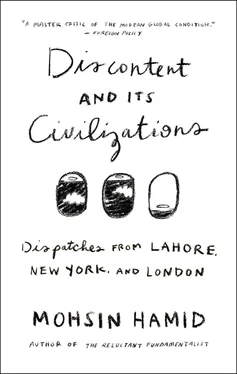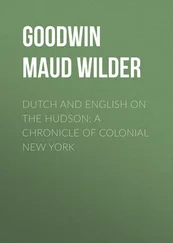People in Pakistan were not awakened to the possibility of violence by a surprise attack that claimed the lives of thousands of unsuspecting innocents. Instead, they have been forced to watch it coming from far off on the horizon, as they read the news about New York and Washington and waited for the reverberations of these distant tragedies to reach them. In that period of mounting dread, there were polite phone calls between heads of state and orderly airport closings. The embassies and multinational corporations sent home dependents and nonessential personnel. Twenty-four-hour news stations showed the gathering of carrier battle groups, special forces, aviation fuel. People had time to see their lives changing.
Perhaps because she stays at home when my father and sister go to work, my mother now seems the most frightened of the three. She is normally a woman of impeccable poise, so I find it unsettling to hear her voice slip from steady on the phone. “We could go,” she says. “But what about your aunts and uncles and cousins? Not everyone can leave. So everyone stays.” She tells me she attended a peace rally and watched as a small group of bearded protesters passed by, accompanied by a much larger flock of journalists. “It was as if they were the Beatles,” she says. Despite everything, my mother has not lost her ability to be amused.
She watches television, still surprised that famous correspondents she has seen reporting from Bosnia and Somalia are now standing in front of buildings near the house. “I have complete sympathy for the Americans,” she says. “It is terrible, what happened. But now they are so angry. They talk about a war on terrorism. But they never seem to think what they do terrifies normal people here.”
I can remember seeing my father afraid only once, when I was in hospital as a child, before I underwent surgery for a vicious case of sinusitis. But having seen him then, I can imagine how he looks now — his lips a bit pale, more wrinkles in his forehead. “Nothing is happening,” he says. “The shops are empty. The streets are quiet. Even the police seem few and far between. But every night we turn on the television, and we see what is coming. We just have no idea what it will mean for us.”
Having no idea makes them nervous. An explosion brought my sister running from her bathroom. My parents reassured her the sound was only thunder. My sister, of course, claims she was not afraid. “The first few days, it was pretty bad,” she says. “But then a week passes and you say, I can’t wait forever. So you get on with it. I guess that must be a little bit like what people are doing in New York.”
She used to live on Thompson Street, only a few blocks from my place on Cornelia. “You know,” she considers, “I’m glad I’m not in New York now. When the attack happened, I almost wished I were there. I still felt more like a New Yorker than someone from Islamabad. But now I hear how scared my Pakistani friends are, the abuse they’re getting, and I’m glad I’m not there. I don’t want to remember New York that way.”
So my family waits, like many families in Pakistan, watching battle plans being discussed on television, ex-guerrillas being interviewed about the Afghan terrain, radical figures threatening bloodshed if Pakistan helps America. Meanwhile, the long summer has come to an end in Islamabad. The city is green and bougainvilleas are blooming. Fresh pomegranates are arriving from nearby orchards, along with grapes and apples. The fruit, which rarely makes the news, still makes people smile.
(2001)
SINCE LEAVING MY birth city of Lahore at the age of eighteen, I had not lived in any one place for more than four years. So when I arrived in London in July 2001, I did not expect to stay long. The previous week, at my farewell and thirtieth birthday party in New York, I entrusted my battered pair of JBL speakers to a friend. I had purchased them on my first day of college, and had carried them from city to city like ancestral silver.
“Take good care of them,” I told him. “I’ll be back in twelve months.”
“You never know, buddy boy,” he said.
My friend, a Lahore-born nomad like myself, had a theory about us. We spoke Urdu, cooked mutter keema, danced the bhangra, regularly overslept; we had roots. And yet we drifted. So he called us water lilies, after a plant rooted not in dry earth but in ponds and streams. It was a rather unmacho sobriquet (unlike, say, “masters of the universe”) but accurate nonetheless.
I landed in London, like so many foreigners, looking for a London that did not exist. Or rather, I was looking for London to express in its whole something that was true only of tiny parts of it. Where were the thugs who would casually call me “Paki” to my face? Where were the accents of Higgins and Pickering? Where were the casks of warm beer, the weekend cricket matches?
The flat above mine was occupied by an American woman, the one below by a French-Italian couple. The waiters at the nearest café were eastern European; the manager at the off-license was Sri Lankan. The city was more white than New York, but ethnically it seemed similarly varied.
I was far from falling in love at first sight. No, London and I began by exchanging a reserved handshake. My chameleon skin was still tinged with the gunmetal hues of New York, and I found London more expensive, quiet, and slow. I missed the energy of my old abode, with its nocturnal howls and incessant exhortations to strive for extreme and rapid success.
Then things changed. The 9/11 attacks placed great strain on the hyphen bridging that identity called Muslim-American. As a man not known for frequenting mosques, and not possessing a US passport, I should not have felt it. But I did, deeply. It seemed two halves of myself were suddenly at war.
For a time, my fiction floundered in the face of world events, so I turned to journalism and essays instead. I wrote a piece for a US publication about the fears of my parents and sister in Pakistan as the US prepared to attack Afghanistan. The paper deleted a paragraph on reasons for the anger felt toward America in many Muslim-majority countries. A similar piece I wrote for a British newspaper was published unedited and in its entirety.
This was my first experience of what I would come to recognize as growing American self-censorship. It was also the first time I became aware of the relative openness of the British press. I began to read more and more of what was being printed in London; I was surprised and impressed. As a writer, I found the atmosphere in London liberating, not just because of what I was reading, but because of the debates I overheard at the office and at neighboring tables in restaurants. My fiction began to flow again. When the end of my one-year work assignment in London arrived, I arranged to have it extended indefinitely.
The longer I stayed, the more London grew on me. I discovered the Ain’t Nothing But… blues bar on Kingly Street, the Lahore Kebab House in the East End. In the late winter of my second year, I marched with a million people to Hyde Park to protest against the impending invasion of Iraq. Looking around me, especially at grandparents with their grandchildren, I found myself thinking: “I am one of them. I am a Londoner.”
This was a disturbing thought, given my predilection for wandering, so I quickly pushed it away. Intellectually and politically, I had found much to admire in London. And yes, I could have a good time. But my heart was still closed; Lahore had been my first love and New York my most passionate affair. London and I, I thought, were destined to be just friends.
Then, one August afternoon in my third London year, London introduced me to my wife. I met her outside a pub in Maida Vale. She and I had been born on the same street in Lahore. We were strangers. We chatted in the sun beside the canal, agreed to meet for dinner. A week later, she returned to Lahore.
Читать дальше












